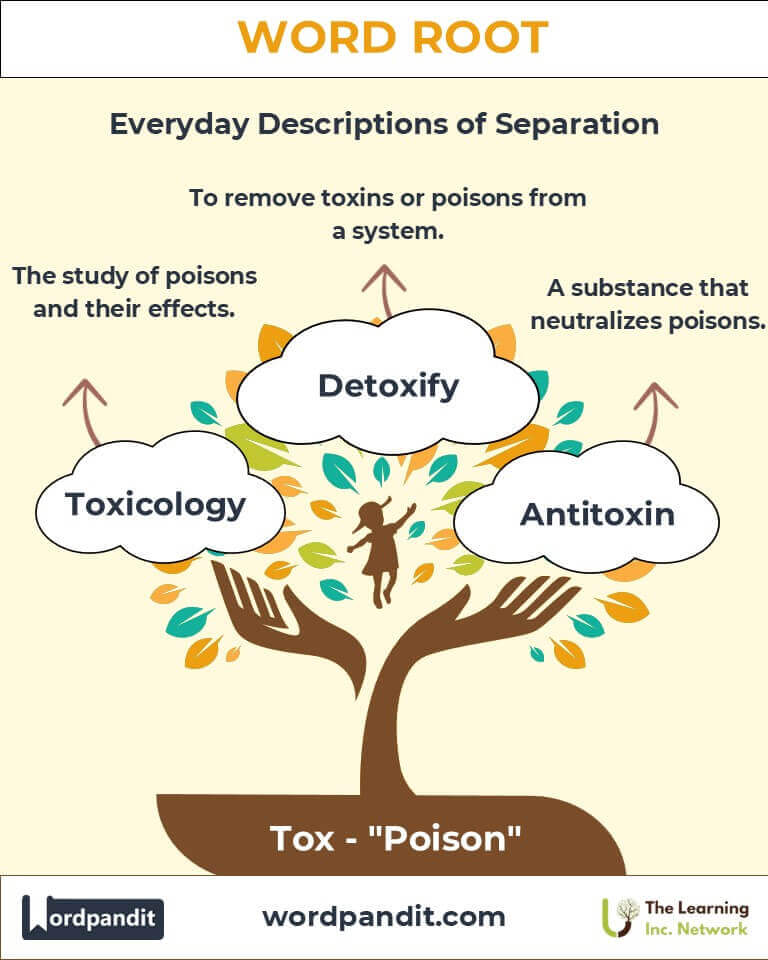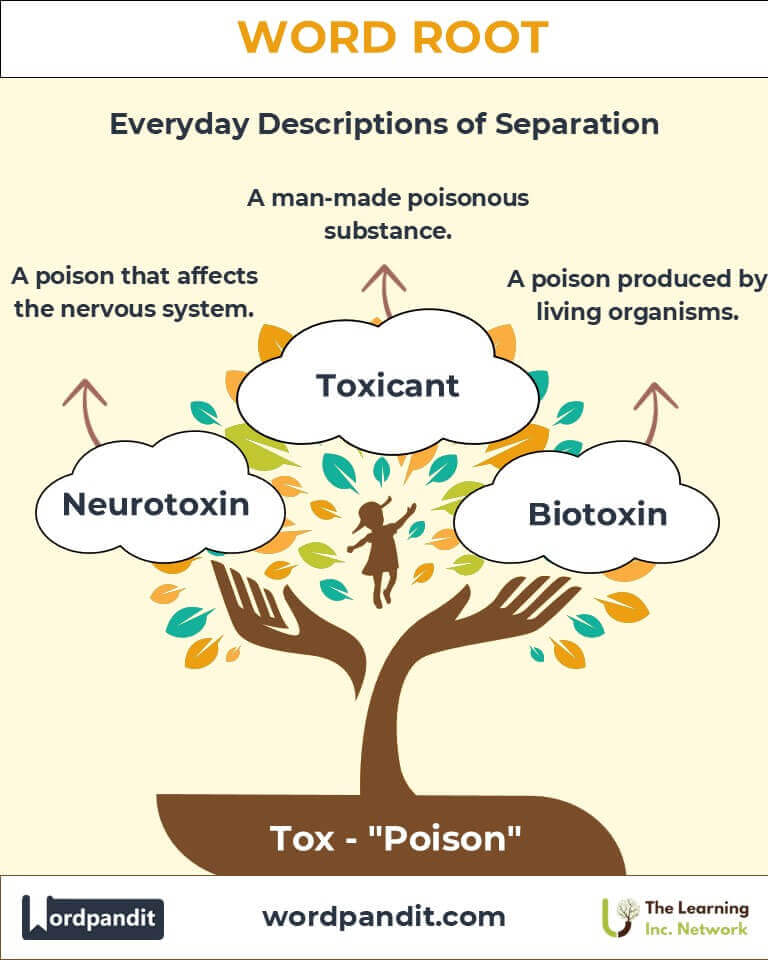Tox: The Root of Poison in Language and Culture
Byline: Discover the significance of the word root "tox," derived from the Greek word for poison, and its impact across language, science, and society. From "toxic" substances to the process of "detoxification," this root highlights the double-edged nature of poisons and remedies in our world.

Table of Contents
- Introduction: The Essence of "Tox"
- Etymology and Historical Journey
- Mnemonic: Unlocking the Power of "Tox"
- Common "Tox"-Related Terms
- "Tox" Through Time
- "Tox" in Specialized Fields
- Illustrative Story: "Tox" in Action
- Cultural Significance of "Tox"
- The "Tox" Family Tree
- FAQs About the "Tox" Word Root
- Test Your Knowledge: "Tox" Word Root Quiz
- Conclusion: The Lingering Legacy of "Tox"

1. Introduction: The Essence of "Tox"
What do toxic chemicals, detox diets, and antitoxins have in common? They all stem from the root "tox," which means poison. Derived from the Greek word toxikon (originally referring to poison used on arrows), this root captures the dual nature of substances that can harm or heal. Pronounced "tocks," this root underscores the significance of understanding the line between danger and remedy in various fields, from medicine to environmental science.
2. Etymology and Historical Journey
The root "tox" originates from the Greek toxikon pharmakon, meaning "poison for arrows." Ancient Greeks used poison to coat arrows, blending their expertise in warfare with early toxicology. Over time, "tox" entered Latin as toxicus and eventually evolved into Middle English words like "toxic" and "toxicity." Its journey reflects humanity’s growing awareness of poisons, their dangers, and their medicinal potential.
3. Mnemonic: Unlocking the Power of "Tox"
To remember "tox," picture a vial labeled "TOX" with green fumes rising from it—symbolizing poison. Imagine an antidote nearby to emphasize the dual nature of harm and healing.
Mnemonic Device: "TOX is the mark of poisons and cures—handle with care!"
4. Common "Tox"-Related Terms
- Toxic (tocks-ik):
- Definition: Harmful or poisonous.
- Example: "The spill released toxic chemicals into the river."
- Toxicology (tocks-ih-kol-uh-jee):
- Definition: The study of poisons and their effects.
- Example: "Toxicology revealed the lethal dose of the substance."
- Detoxify (dee-tocks-uh-fy):
- Definition: To remove toxins or poisons.
- Example: "Doctors worked to detoxify the patient’s system after poisoning."
- Antitoxin (an-tee-tocks-in):
- Definition: A substance that neutralizes poisons.
- Example: "An antitoxin was administered to counter the snake venom."
- Toxin (tocks-in):
- Definition: A natural or synthetic poisonous substance.
- Example: "The bacteria produced a toxin that affected the nervous system."
5. "Tox" Through Time
- Toxicum (Latin): Originally referring to poisons used in warfare, this term laid the foundation for modern toxicology.
- Toxicant (Modern): A more recent term differentiating man-made poisons from natural toxins, highlighting the evolution of the field.
6. "Tox" in Specialized Fields
- Medicine:
- Neurotoxin: Poisons that affect the nervous system.
Example: Used in studies of nerve function and disorders.
- Neurotoxin: Poisons that affect the nervous system.
- Environmental Science:
- Biotoxin: Poisons produced by living organisms like fungi or algae.
Example: Responsible for harmful algal blooms.
- Biotoxin: Poisons produced by living organisms like fungi or algae.
- Pharmacology:
- Toxicodynamics: The study of how toxins affect the body.
Example: Helps in designing safer drugs.
- Toxicodynamics: The study of how toxins affect the body.
- Forensics:
- Toxicology Reports: Critical in investigating causes of death or poisoning.
7. Illustrative Story: "Tox" in Action
In a remote village, a rare plant produced a toxin that paralyzed its prey. A young scientist, Maya, discovered its potential for treating chronic pain. Through careful detoxification and research, Maya developed a life-changing medication. Her work showcased how understanding "tox" can transform poison into a cure.
8. Cultural Significance of "Tox"
The duality of "tox" resonates in myths and traditions worldwide. From the poisoned apple in Snow White to antidotes in ancient Chinese medicine, "tox" symbolizes both danger and salvation. Modern terms like "toxic relationship" extend its metaphorical reach, reflecting harmful social dynamics.

9. The "Tox" Family Tree
- Ven (Latin: Poison):
- Venom: Poison from animals like snakes or spiders.
- Venomous: Describes organisms that inject venom.
- Pharm (Greek: Drug):
- Pharmacy: The practice of preparing and dispensing medicinal drugs.
- Pharmacology: The study of drugs and their effects.

10. FAQs About " Tox "
Q: What does the root "tox" mean?
A: "Tox" means poison, originating from the Greek word "toxikon," which referred to poison used on arrows. Over time, it came to represent harmful or toxic substances in both literal and metaphorical contexts.
Q: What is the difference between "toxic" and "toxin"?
A: "Toxic" is an adjective describing something harmful or poisonous, while "toxin" is a noun referring specifically to a poisonous substance, often produced by living organisms like bacteria, plants, or animals.
Q: What does "detoxify" mean?
A: Detoxify means to remove toxins or harmful substances from the body or a system. This can refer to medical treatments to neutralize poisons or to lifestyle practices like avoiding unhealthy foods to cleanse the body.
Q: Are all toxins naturally occurring?
A: No, toxins can be natural or synthetic. Natural toxins are produced by organisms like snakes (venom) or fungi (mycotoxins), while synthetic toxins are human-made, such as industrial chemicals like pesticides.
Q: What is toxicology?
A: Toxicology is the scientific study of poisons, their effects on living organisms, and how to detect, prevent, and treat poisoning. This field helps develop antidotes and understand environmental and industrial risks.
11. Test Your Knowledge: " Tox " Mastery Quiz
1. What does the root "tox" signify?
2. Which term describes the process of removing toxins?
3. What is toxicology?
4. What is an antitoxin used for?
5. Which of the following is an example of a toxin?
12. Conclusion: The Lingering Legacy of "Tox"
The word root "tox" reminds us of the fine line between harm and healing. From ancient arrows to modern medicine, it highlights humanity's evolving understanding of poisons. As science progresses, the dual nature of "tox" continues to inspire discovery, caution, and hope in equal measure.














